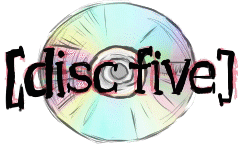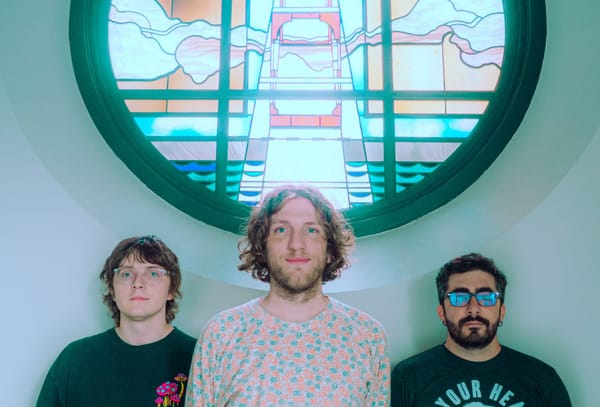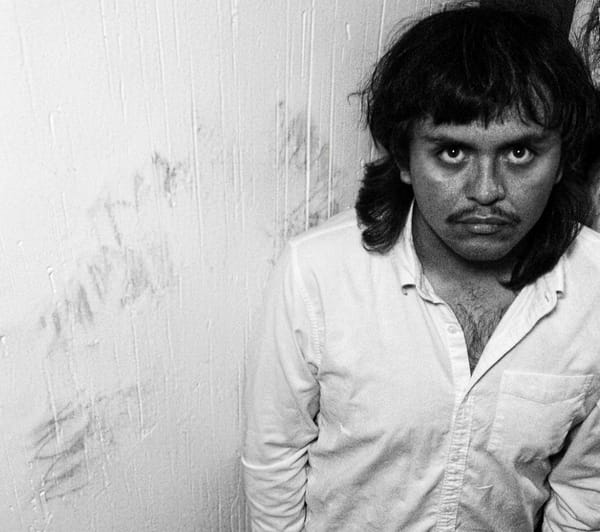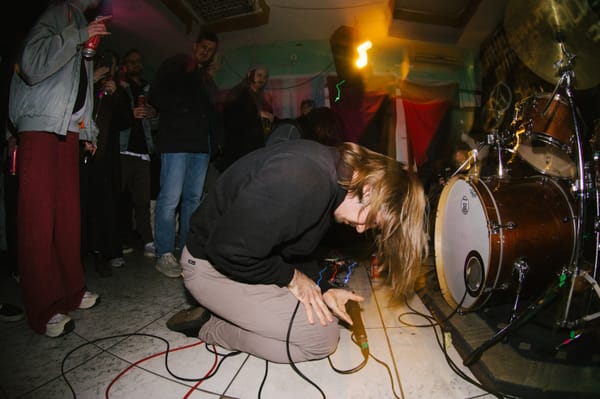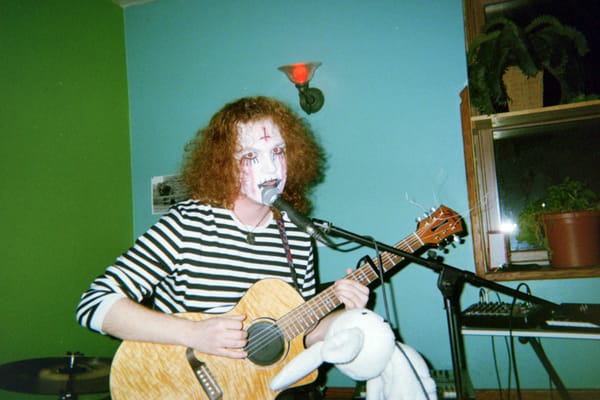Born vintage, came out analog: a chat with Marc with a C
"Mostly, I have a decreased interest in having Marc With a C 'pass as normal - I'm weird. I accept that."
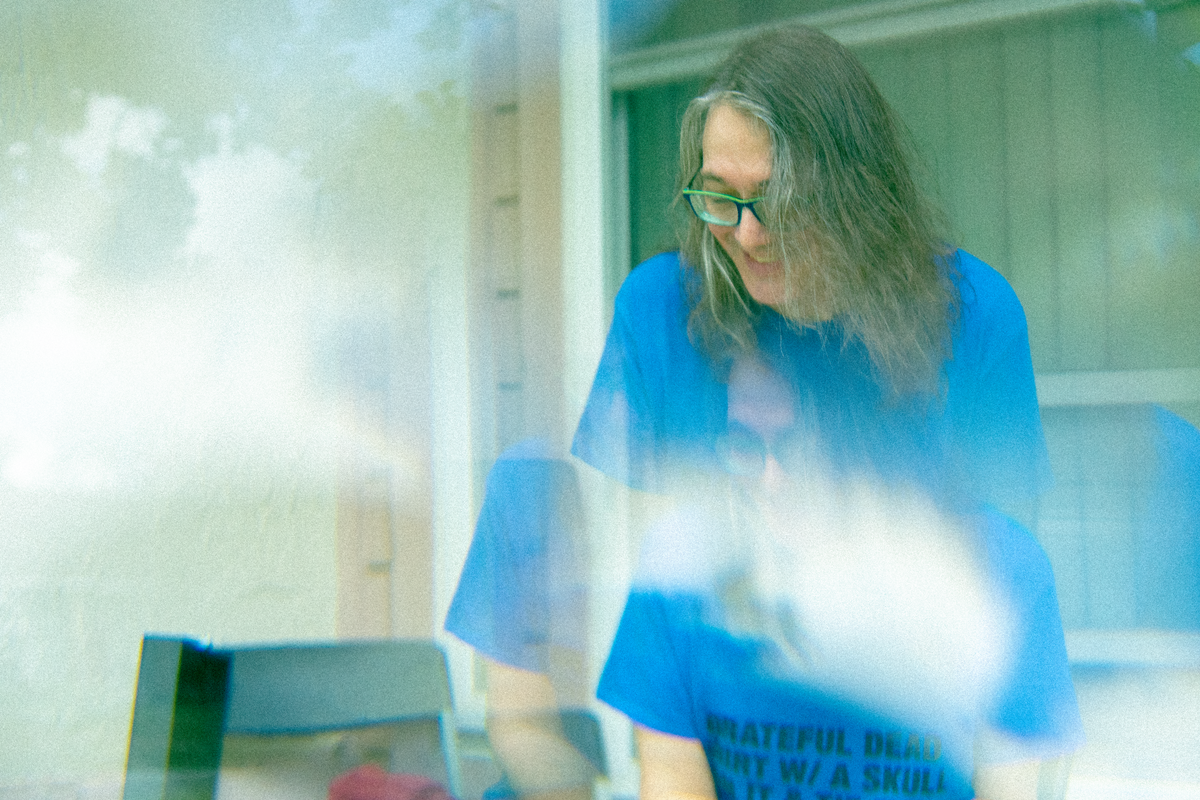
Marc with a C is a name that started coming up a lot for me recently. In two different interviews I’ve done this year, they were shouted out alongside names like They Might Be Giants and Neil Cicierega. a person named Rose mentioned that they were her favorite artist, so shortly after our interview, I navigated over to Marc’s Bandcamp and was immediately like, “holy shit, there are five billion albums in here!”
Marc with a C is Marc Sirdoreus, and if there’s one thing you can say about Marc, it’s that they are very prolific. Marc’s been making music for over two decades, and their discography covers everything from “geek rock” to power pop to experimental electronica. It was honestly a little daunting to sift through their discography twenty years late to the party, but it didn’t take long for me to be sucked into it completely.
Since there was a recent reissue of their 2008 album Linda Lovelace For President, I decided to start there. Fittingly, its first lines are: “I’ve made so many records that I don’t know what to play / And I’ve told so much about myself I don’t have much to say…”
Marc’s music tends to cycle between sardonic, lighthearted, and emotionally devastating; usually, one album will hit all those notes at once. Take Bubblegum Romance, for example. An upbeat song like the fan favorite “Nerdy Girls” is sequenced between tracks exploring domestic abuse, addiction, and mental health issues…but then it loops back to being silly with a song about shrimps on a rocket. They really capture the full breadth of human emotion: joy, anger, sadness, and shrimp.
Their discography also takes time to celebrate the underdogs. Marc’s released an album consisting of songs from Shock Treatment (the oft-forgotten Rocky Horror Picture Show sequel), a re-imagining of underappreciated musician John Entwistle’s work, and a collection of cover songs by The Monkees, a band so often overshadowed by that one much-more-famous-and-much-more-British boy band.
Marc’s latest album is Steamed Hams, an album that digs into the ways consumerism, censorship, and general quackery attempts to turn us all into the gray blob episode of The Fairly Odd Parents. It's about the shame and confusion that comes with having your identity constantly scrutinized and policed. But, in true Marc with a C fashion, it’s also about celery flavored Jell-O, giant staple guns, and cooking omelettes on Chrysler exec Lee Iacocca’s face. Steamed Hams tackles the subjects of identity and what it means to assert it, all with those dashes of absurdity that makes their works so charming and magnetic.
It’s important to note that there are two “phases” of Marc’s discography (aptly called Phase I and Phase II).“On a musical level, Phase II was me starting over,” Marc tells me. “The first album billed to Marc With a C in Phase I, [Human Slushy], ultimately showcased the producer's vision and I've had to answer for that for more than two decades. [The first Phase II album] Thanatophobia was made using a number of songs that had been rejected by that producer, and was only recorded on the instruments I'd have known how to use when making that first record.” Notably, that first album Human Slushy also has a “Taylor’s Version” type of re-recording that gives Marc more control, and it amusingly changes some of the more dated lyrics to be about squirrels.
These kinds of reclamations are key to the Marc with a C canon. Both early on and in their more recent works, they are toying with personas, presentations, and identity. “Phase II gives me the chance to kick out the parts that don't fit me, and allows me to start over and truly do what I intend," Marc continues. Initially, the plan was for them to take a mini vacation from music between Phase I and Phase II, but due to a medical misdiagnosis and subsequent incorrect treatment, Marc found themself “impressively ill,” and ended up recording Thanatophobia between bed rests and waiting rooms.
Historically, Marc’s releases have been lo-fi and DIY, and their dedicated fanbase was built by playing intimate live shows and selling home-made CDs. Nowadays, Needlejuice Records handles that side of things, but there’s still a strong dedication to keeping that underground vibe alive via quirky lo-fi physical releases. “Here at Needlejuice, we're just run by a group of people who are nerdy about physical media,” NJR co-founder Jace McLain tells me over email. “Although vinyl and CDs are among the most common types of media we produce, we've always been drawn to producing more oddball formats.”
Thanatophobia (2022) and Human Slushy (2002) were released on floppy disc (it doesn’t get much more lo-fi than compressing an album to 1.44 MBs!) and Thanatophobia had music videos released on VHS. “Floppy disks are our latest foray into a strange format, and certainly a challenge,” Jace continues. “We're not going to claim that these formats are hi-fi or will sound even remotely good. But it's about the fun and collectability of putting out music on whatever physical media formats are possible.”
Jace tells me that they first heard of Marc with a C back when the nerdcore genre really started picking up steam. “Festivals like Nerdapalooza and Orlando Nerd Fest were popping up each year, and Marc was consistently on these lineups,” he tells me, citing other nerdcore / comedy artists like Devo Spice, Worm Quartet, and Insane Ian as festival performers. "In 2017, when the label started and we were putting together our first releases, it was just a no-brainer to ask Marc about collaborating on some projects.”
Uploading Marc's music to streaming came with a few challenges. Spotify’s rampant botting problem hit Marc, causing Life's So Hard to be temporarily taken off the service. Spotify punishes the musician instead of the scammer, leading to their accounts being flagged and their music removed. Jace tells me, "Spotify's official answer to how artists are supposed to deal with this is to say that artists need to be obsessively checking their stats on every single song, every single day, and looking for ‘suspicious activity’ to report.” Putting the onus on the artist is an absurd policy, and it’s just another one of the bajillion reasons to swear off Spotify.
Marc’s developed a bit of a cult fandom over the years - currently, they have a good deal of Patreon subscribers, a well-trafficked Discord server, and they even have a fan-made documentary from Jo Canterbury, Half Serious Half Kidding. “If there's a passive Marc With a C listener, I have yet to meet them,” Marc jokes.
It makes sense that they’ve built such a following; Marc is well known for up-close-and-personal live shows and for their generosity. “[Marc’s] my favorite artist and for sure the one I own the most merch from,” Alex of (^_^) told me back when I interviewed them this past June. “I took a plane to see what was billed as their last in-person show, a three-song set in a public library. I got to meet them in person for the first time the next day where he gifted me rare CDs and records, and I brought all of my own to get signed.” Alex has also worked with them on releasing projects Marc's affiliated with, including The Left Joins and their “not-so-secret” side project, Natural History Museum.
a person named Rose also had high praises. “i got into their music in about october 2020-ish…there was something about their half-serious-half-kidding style of songwriting and storytelling that really spoke to me at the time, and still speaks to me now,” she told me over Discord DMs. She cited Marc with a C as a major influence on her own demo tapes, and went on to tell me that Marc’s earlier lowest-of-fi tracks helped to push her to record to four-track herself. “Linda Lovelace For President and This World is Scary as Fuck flipped a switch in me that made me all about really saturated and lo-fi pop songs with occasional casios and guitars and weird-sounding drums.”
And even though they’re unable to perform live in the same capacity as they once were, Marc still makes time to interface with fans via Patreon (with very affordable and accessible tiers) and they still have intimate live shows, albeit over live stream.
Below the cut here are selected excerpts from our full email correspondence. I found it to be a very insightful conversation about not just their career, but the changing music landscape, social media vs in-person fan interactions, and adapting your art to different abilities.
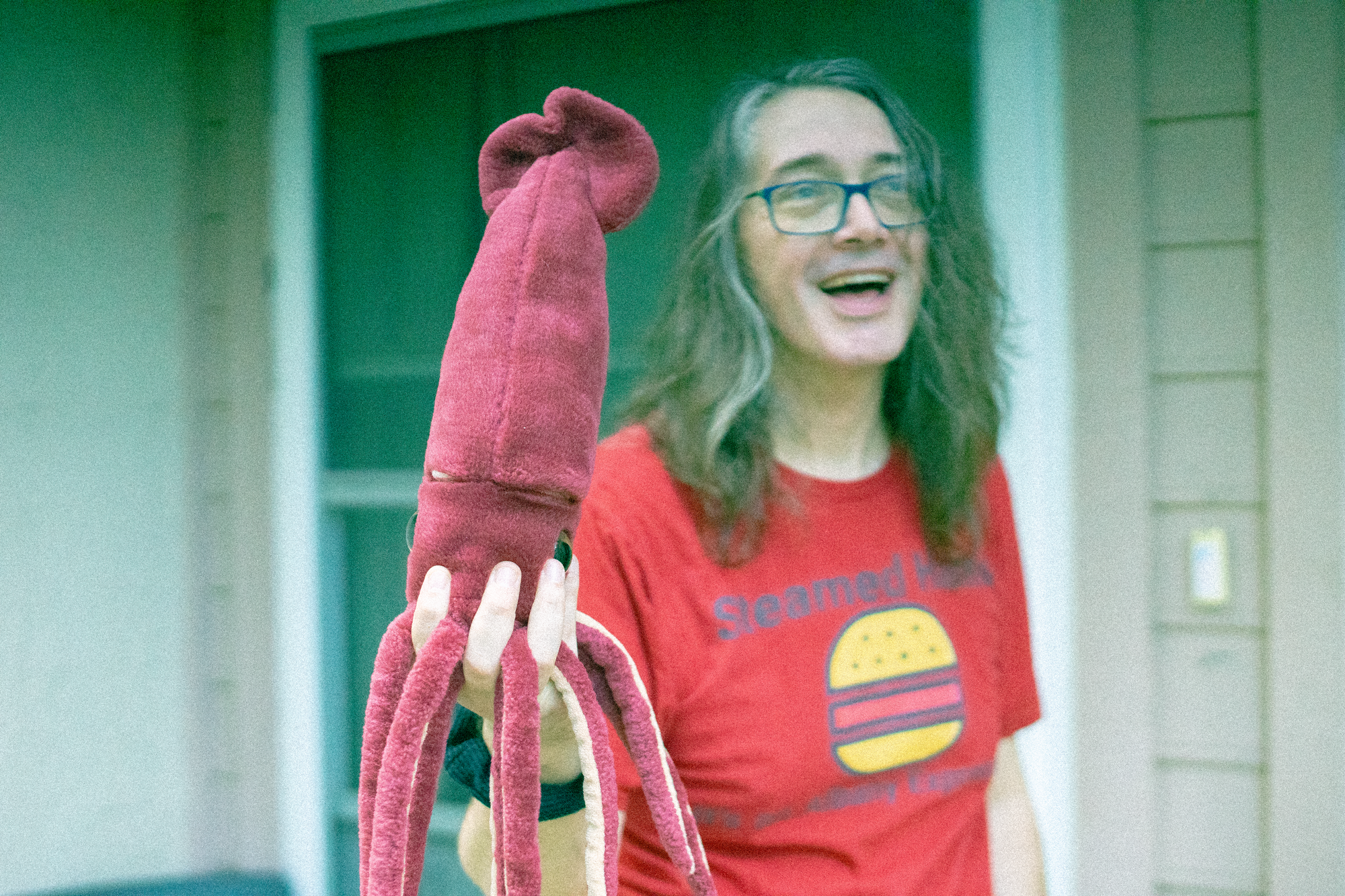
What was it like revisiting and re-showcasing your past works for the 25th Anniversary comp, the Linda Lovelace For President reissue, and other digital reissues? Is it weird to have this mix of Phase I and Phase II coming out around the same time period?
I'm so thrilled that someone has realized how deeply I've been diving into MWAC lore past and future recently. It just sort of worked out that way -- to me, it isn't weird, because I don't think there's a wide universe between the tones on, say, the Life's So Hard album from 2006, and the tones on Steamed Hams. There are different perspectives, but it's pretty easy to tell it's coming from the same person. To me, it feels like a big glob of "yep, this is stuff I have made, and I am happy people want to hear it and can maybe like it."
Can you tell me a little bit more about the split between Phase I and Phase II? Do you see hints of Phase II Marc in your older works?
Phase I Marc was ultimately a false persona meant to give me sort of a “code" to work within onstage. This meant that initially the persona was there to "serve the songs," but by 2014 or so, I think it'd become backwards, and the songs were making the persona bend in ways that didn't always work. By the time I was finally making albums in 2001, there were expectations that the persona would more or less be audible on the records somehow, and I don't know if that divide was ever truly closed.
Now I'm committed to doing things as myself, rather than an exaggerated version of that for the stage. Someone pointed out to me that the performance in The Obscurity Show movie was more like "a Marc Sirdoreus show" [than a “Marc with a C” show], and once I rewatched it with that mindset, I can't argue. I think starting around the time of the Exactly Where I Am album, I wasn't able to mask with arrogance as well, I lost most of the ability to even pretend.
Your discography is huge and you’ve been in the music game for so long - I was wondering how your approach to music and DIY ethos has transformed over the decades. Was it difficult to transition from like, selling self-made CDs at a venue versus having to establish an Internet presence / streaming presence?
It still is! This isn't complaining in any way, please understand -- but it's a massive change to go from keeping all of the music wholly secret down to the mastering, and only really sharing it with the visual artist and then approving that artist's work. Past that, I sent it to the plants, and I'd be done - bam, album out.
As you can guess, there's a bit more of a chain of command when Needlejuice is involved, and I'll probably never be used to it, because I'm still surprised that I'm even able to make records -- it has always felt like a magic trick, having a song in your head, and then being able to play back an approximation of that first idea and all that it became. It's a slower process, but there have been benefits.
For example: A person from Needlejuice really didn't want the song "Staplegun" left off of Steamed Hams, but it was never an ultimatum. They were behind me and remained so. However, them having such strong feelings about the song mixed with things taking longer now gave me enough time to reimagine how the song could fit in the tracklist. It went from a pretty good 14-song album to a 16-song album that I'd rank in a three-way tie for my favorite albums of my own original material.
Having reasons to just... wait? It's new for me. I'm finding that it has its perks. One thing that I don't think people realize, though, is that I work harder than ever to make the songs what they need to be -- I love the other artists on Needlejuice. These are all highly inspiring acts, and I refuse to send something new to Needlejuice if I don't believe that it can hang with the brilliance of many of the acts on the roster. I tell myself "I gotta come correct" with any move that I intend to show Needlejuice, haha.
What are the others tied for your favorite of your albums?
For different reasons, and though they are tonally very different from each other, not to mention very different from Steamed Hams, those would be 2006's Normal Bias and 2018's Obscurity.
In the press release for Steamed Hams, you mention using percussion tones "as incorrectly as technology will allow" - can you tell me a little more about that? Are you using drum samples or programming?
No, no samples, and no actual programming. I've been using mostly electronic drums in recent years -- things like built-in drum machines on classic keyboards. I got a full electronic kit around a year ago, because it takes less physical strength to play which is massive for my health, I can even play with my fingertips when I need to!
Some of the built in patches are a lot like late 80's R&B, and I found that if I'd use those, but bump the volume until it started to clip, I'd get something close to "industrial" tones, and historically, there's nothing like that on Marc With a C records. In many cases, the songs are built from up to four wholly different passes of percussion, and then I drop certain ones out, bring others in, and sometimes I'll even move the drums slightly out of sync to keep myself engaged, to hear a little slack – trying to make the processed drum still feel human, as this human is still operating it live!
I know you've always been a little on the experimental side, but have you found yourself leaning into that a little more in recent years?
Absolutely. The more that I planned to do whatever I was working on live on stage, the less I'd usually go into full-on weirdness in obvious ways on the albums, because audiences usually like you to at least sound as if you might've been the person on the original recording.
While I don't see much value in exactly replicating a recording onstage, it helps to compromise that in the middle to keep your records interesting, and the shows could stay familiar enough for the audience to allow you to take them where you want to go together.
When I knew I was unlikely to be doing in-person shows anymore due to health, there was no reason to not go all the way with "leaning into my weirdness", as Jace from Needlejuice calls it.
Has exploring gender identity and being more open about your gender fluidity changed your approach to songwriting? I've talked to artists before who have found they expanded their music / got a little more experimental the more they experimented with / explored gender, so I'm curious if you had a similar experience.
Hmmm. I'm not sure how to answer this without seeming evasive! Much of it was sorting it out through the perspectives of other people in the lyrics, but I've been on a life-long mission to understand myself, and it's pretty audible to me in the songs, the parts where I show up in the mix, even though it might be me attempting to look through another person's eyes to understand their own self-perception. Since I've always known I was different from what one might see on typical television commercials for my gender identity, it's always been there in the music, often right under your nose!
I only started being publicly open about being genderfluid a few years ago, so that might explain why the two seem intertwined on my records, but I argue that my albums have always been experimental simultaneously!
On that note - has it been scary centering gender identity more in recent years?
Nah. If anything, I'm not comfortable with the terminology - even "genderfluid" doesn't seem right. I've had a whole life of knowing that I didn't neatly fit into any column. The most I ever did to try to fit in either happened during school in hopes that bullies would knock off all their crap, and arguably, the first Marc With a C album, where I tried to put my stuff in the hands of a producer because I thought it's how it had to go to be taken seriously.
I've sang from perspectives that originate from the entire spectrum of gender, and the most uncomfortable ones are the people in songs like "The Right To Bear Arms" from my Exactly Where I Am album, the dude that narrates "Dear Son" from Normal Bias, and to an extent, even the guy who refuses to admit he's full of crap in "Jeep Factory" on Steamed Hams. They all seem cut from the same cloth, and that's arguably the one that is the least fun to inhabit, but it's a big part of what I do, a big part of how I write, and why I have any ability to try to empathize with the type of person who might say those things.
I wanted to ask a little bit more about how your health issues have affected your relationship with music, if you're comfortable talking about it. You mentioned how it affects your drumming, and I also learned via the documentary that you had hearing issues that affected your music in a very literal sense. Has it been difficult to adapt your music career to your health?
Yes and no. If I hadn't reckoned with having different abilities, you'd have never heard of me. I'm probably spinning more music at home than ever before, as it really helps to soothe me. Something is almost always playing in the house unless someone has to make a phone call. Even right now, I'm playing a David Byrne record!
As far as how it impacts what I make? I try to remember a line from a Frank Black song, and that line is: "You cannot do what you can't." I do the parts I can, and it morphs based on abilities, what's easy, what's comfortable, and above all else, what the song I'm working on needs. I've definitely had to learn to pace myself better – no marathon shows for me anytime soon, ha.
I guess if I really need to boil it down? I take a little more time than I used to for most things, but the best stuff almost always happens serendipitously or as a happy accident.
Lastly, on this portion, with my memory getting so tricky, I get to find fully realized songs sometimes I'd not released, and I have to figure out how I even made it. There's around two hours worth of that type of stuff from 2022-2023 alone.
Was it scary opening up about your health / writing songs and entire albums about it?
Not really. I've been addressing my own mental health since I started writing. Always admitted it musically. A song that I was first playing around 2004 called "Bite Size Help" was a pretty on-the-nose autobiographical tune about having a mental breakdown and trying to seek help while in the midst of said breakdown. Just like the external stimuli that I work out in musical writing, the same goes for what's actually and actively inside of me. The hope is to take stock of it all and turn it into something beautiful, or at least helpful.
This might surprise you, but I found it much easier to write songs while I had cancer but hadn't told the public. It was harder to tell everyone that I had cancer, and after I tried telling just a few people but got very drained from having to console them (which is something most chronically ill people have experienced), I decided to wait to make a full announcement about my diagnosis until I had good news so I wouldn't need to sort of "be there for everyone else." My favorite line I've written about all of my health issues is the simplest one: "I'm fucking tired of being strong."
I’m really interested in the relationship you have with your fans. Marc with a C fans seem pretty hardcore. Have you always been close with your audience, or has it been easier now because of social media and stuff?
You nailed it! The main difference between those first issues of albums versus the reissues that are being prepared now [is that] the audience that would usually purchase those in the past had usually just seen me onstage, and often, people focused on what was perceived as the ‘comedy aspect’ of the Marc With a C catalog. The audience that listens now is much smaller, but they tend to actively notice the best written and most inherently emotional material, rather than whatever they giggled at, and that divide is everything to me.
It's true that in Florida, I was often boiled down to the songs people knew from the radio; "Life's So Hard", "Nerdy Girls", "Laura, I Need Medicine" and the like. There was a small faction like that who'd appear at each show, and you don't want to disappoint them, so you play a few of those expected tunes, but the roughly 80% of the remaining audience were as sick of those songs as I could sometimes get, and they'd get frustrated at me playing those songs so often. Now that I'm relegated to performing online, I don't have that issue, and people are usually just down for the ride and wherever I'd like to take them. But specifically about the closeness to the audience...
I've always believed that if someone hears what I do, with as atypical as it usually is perceived, and it resonates, we're usually kindred in some way. I equally believe that I'm no more important than the person watching the show, I just happen to be in charge of the performance. We're equal, we simply have different roles! Without them, there's no Marc With a C.
There's plenty of acts who ignore the audience. The audience is often a reflection of something that the art brings to the fore, and I would prefer to pay attention to that and build on and with it. Very early on in performing as Marc With a C, I'd literally tell the audience from the stage where I'd be eating after the show so we could hang out and chat, but I also found that this made people somewhat more agreeable with me than they might be if they hadn't first seen me onstage – ultimately, the power dynamics were just off, so I only got genuinely close with a very few people.
After 2006, I was very wary of potentially hurting someone without realizing it, so I started to keep myself pretty open for communication with the listeners, but I still made sure to keep things at an arm's length. People will confide things in you because they like what you make, and when that happens, you have to carry that out of respect, and remember that they felt like they could tell you, when they couldn't tell their parents, even. My job is to not fuck that up.
Have you always been close with your audience, or has it been easier now because of social media and stuff?
Social media makes it much harder because centralizing communication isn't so easy, and in my health position, even that can be draining, and I'm not overselling that! There have been attempts to have spokespeople, management, social media managers, but ultimately, when you're DIY, people expect you to be DIY. You'll get stuff like "why are you always posting about your music?", but you'll be ignored if you have someone else do that part for you first a lot of the time.
I'm thankful that anyone digs in and tries out what I do, especially since I can't meet with people in person anymore unless it's a highly specific and planned event. They have a bond with what I do, not so much with who I am, but potentially their perception of what I am. Rattling that isn't something I'm willing to do. A long time ago, I'd said "the most punk rock thing to do is just be nice", and each time I live by that motto for Marc With a C, I'm rewarded in some way, along with "Maybe it'll be good?" and "the right people will get it". I think I might be finally figuring out how to do this job, Jenn!
Check out Steamed Hams over on Marc's Bandcamp, and check out Needlejuice's release of it, as well. You can follow Marc over on Bluesky, Instagram, and Patreon.
